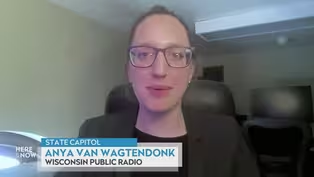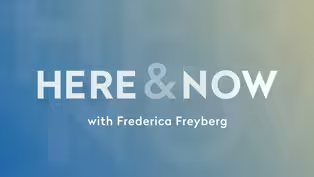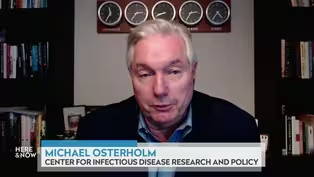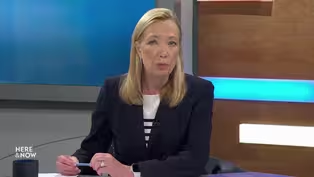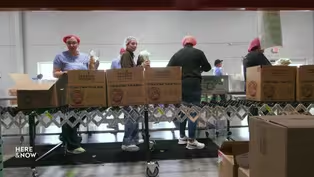Here and Now
Here & Now for June 27, 2025
Season 2300 Episode 2350 | 26m 49sVideo has Closed Captions
Watch the entire episode of Here & Now for June 27.
Watch the entire episode of Here & Now for June 27.
Problems playing video? | Closed Captioning Feedback
Problems playing video? | Closed Captioning Feedback
Here and Now is a local public television program presented by PBS Wisconsin
Here and Now
Here & Now for June 27, 2025
Season 2300 Episode 2350 | 26m 49sVideo has Closed Captions
Watch the entire episode of Here & Now for June 27.
Problems playing video? | Closed Captioning Feedback
How to Watch Here and Now
Here and Now is available to stream on pbs.org and the free PBS App, available on iPhone, Apple TV, Android TV, Android smartphones, Amazon Fire TV, Amazon Fire Tablet, Roku, Samsung Smart TV, and Vizio.
Providing Support for PBS.org
Learn Moreabout PBS online sponsorshipThe following program is a PBS Wisconsin original production.
>> Contention over the state budget continues as federal budget cuts hit home.
While Middle East conflict draws sharp.
Political contrasts.
[MUSIC] Tonight on "Here& Now" work on the next two year state budget is back on.
As of today, we get an update from the Capitol.
Also where state and federal funding leaves two tribal programs involving health care and healthy food.
And members of the medical community take a stand against changing vaccine recommendations at the federal level.
It's "Here& Now" for June 27th.
[MUSIC] >> Funding for "Here& Now" is provided by the Focus Fund for Journalism and Friends of PBS Wisconsin.
>> Getting to the point of voting on a state budget turns out to be a difficult affair.
The legislature's Joint Finance Committee was to go into session this morning, but has now pushed that off to 8 p.m. Wisconsin Public Radio Capitol reporter Anya van Wagtendonk joins us now from the Capitol with what's happening.
Hi, Anya.
Thanks for being here.
>> Hey, thanks for having me.
>> So what is happening?
>> Not very much.
As you say, they were meant to go into session earlier this morning, and we have kind of waited around and heard, as they have moved that start date quite a bit.
Or that start time, I should say.
And so what that tells me is that they are meeting in closed caucus.
So things are certainly happening.
They are just not happening in a way that we can see it.
So we're waiting to see kind of what agreements they bring to the table.
>> Could they actually cancel tonight's session?
>> I suppose that's possible.
You know, I think everyone's kind of running around a little bit, trying to figure out exactly what's going on.
A lot of texting of sources and other journalists and, you know, people that we know inside of lawmakers offices.
And I think the answer is no one really knows what's going on.
But I spoke with one reporter who's been covering the budget for a lot longer than I have, and he said, essentially, you know, if you can dream up a scenario, it is possible.
And so really, it's possible anything could happen tonight.
It could go very late or things could get kind of shifted around.
>> Does this have to do with holdouts?
Republican members of the Senate as holdouts?
>> Yeah.
You know, again, we don't know exactly what sort of the push and pull is.
But we have seen a lot of different scenarios kind of unfolding over the last couple of weeks.
So first we saw legislative Republicans and Governor Tony Evers talks between them kind of break down.
Then they returned to the table.
Then discussions between Senate Republicans and Assembly Republicans kind of came to a standstill.
There were some barbs being traded on social media among Republicans over the weekend.
And so all of that is kind of within this loop.
We know that Governor Tony Evers has certain things that he will not sign a budget without.
Republicans have said, you know, they access to meaningful tax cuts.
And so all of this is kind of swirling around.
And I think as we get close to that, that fiscal year deadline, we're really starting to see things play out.
>> But meanwhile, they have some very big ticket items to decide on tonight.
And potentially through the weekend.
>> Yeah, that's right.
They have both a long list of things in general.
There's I think, 50 items on the agenda for this, this meeting that has been noticed.
And then as you mentioned, some of them are really significant.
Notable the University of Wisconsin system.
Those are notable in part because they are Governor Evers big priorities.
He has said he will not sign a budget that doesn't have meaningful investment in either of those.
And so what that ends up being is a little bit of leverage for Republicans to kind of get him to the table on those on those tax cuts.
But that also means that, you know, that there is, as we mentioned, in the breakdown between Senate Republicans and Assembly Republicans, a lot of push pull around the amount of spending that the Democratic governor would want.
>> How does the slimmer Republican majority inform how this budget session has gone?
>> Yeah.
So that also really speaks to, again, some of those chamber disputes that are going on.
So essentially there are enough Republican votes in the Assembly.
And ordinarily how this could work is that Republicans just vote for the Republican budget.
And then the governor could go through and kind of use his veto pen, the Democratic governor.
But in this case, in the Senate especially, it's an 18 to 15 majority.
So a much slimmer majority.
So if Republicans lose two votes, they don't have a majority there.
And it's actually looking like they have lost two votes.
There are two outspoken Republican senators who have said they just can't support the amount of spending that their Republican colleagues are proposing in the Joint Finance Committee.
And so, because of those slimmer majorities, that means either Republicans sort of need to get their folks in line or give them concessions, or they need to bring Democrats to the plate.
And the way to bring Democrats to the plate is to kind of offer a more palatable options to Democrats.
And so, again, we don't exactly know all that's going on between closed doors, but that's a huge part of the dynamic that's at play.
>> Was really about less than a minute left.
How does a ruling out of the state Supreme Court around Evers vetoes play into this budget process?
>> Yeah, I think that's been a big part of the conversation, because breakdown of trust again, between Democrats and Republicans in terms of how the governor has used his veto pen in the past.
And so what that did was kind of give a little bit more clarity to the use of his veto pen.
And so at the end of all of this process, we will at some point get a budget to the governor's desk.
And now there's just some clarity on how he can and can't use that.
>> And do we expect that budget to get to his desk next week?
>> You know, it takes a while to write a budget.
So even just that labor of that will take a little bit of time.
So I am not terribly optimistic in that sense, but I'm not in the prediction making business.
really appreciate you joining us, Anya van Wagtendonk Wagtendonk from Wisconsin Public Radio.
Thanks.
>> Thank you.
>> Directly following U.S. Military strikes in Iran this week, the Department of Homeland Security issued a heightened threat.
Environment bulletin warning of low level cyber attacks by hackers affiliated with the Iranian government.
The military cannot comment on force protection measures for U.S.
Troops in the region, but the Wisconsin National Guard does confirm troops from this state are deployed in the Mideast in response to the strikes against Iranian nuclear program sites.
Wisconsin U.S.
Senators weighed in.
Democrat Tammy Baldwin saying, quote, diplomacy, not war, is the answer.
Here I stand with the people of Wisconsin who do not want to get into another war in the Middle East and put service members at risk.
Baldwin also introduced a bill to prohibit federal funds going to military force in or against Iran without congressional authorization.
For his part, Republican Senator Ron Johnson said, quote, the president has been very clear we should not allow Iran to become a nuclear power.
I support President Trump's action in this case on childhood vaccinations.
Parents may be wondering what's happening after every member of the Advisory Committee on Immunization Practices was fired by DHHS Secretary Robert F Kennedy Jr.
The new committee, chosen by Kennedy, who is a vaccine skeptic, met this week and announced a review of immunization schedules and had some other changes.
The advisory committee makes recommendations to the CDC on which immunization should be given and whether they are covered by insurance.
Amid this upset to established vaccine guidance, a new project has taken shape at the University of Minnesota Center for Infectious Disease Research and Policy.
It's called the Vaccine Integrity Project.
Doctor Michael Osterholm is director of the center.
He joins us now.
And thanks very much for being here.
>> Thank you for having me.
>> So were there changes made this week regarding immunizations that raise alarm bells for physicians and others?
>> Well, in fact, there were several things that happened at this two day meeting.
One is, is that we were able to count over 50 different instances where mis or disinformation were shared, things that just simply weren't true.
And so that leaves people often confused as to wait a minute, now what?
What is the truth about this?
In addition to that, they took certain actions and as a, for example, they voted on removing thimerosal from influenza vaccine.
Well, let me just back up.
Thimerosal is a type of preservative.
It's ethyl mercury, not methylmercury, which is the methyl is the dangerous type.
Ethyl is not.
And what it is used in multi-dose vials so that as a vial might be used over a day to day and a half.
Contamination doesn't grow in it.
After having inserted the first needle into it.
When in fact you look at overall use of thimerosal, less than 6% of all influenza vaccine doses have that.
And as I pointed out over the last 30 years, there's been ample, ample evidence showing there is no safety issue with thimerosal.
But this has been a very favorite target of the secretary over the years.
He's actually written about it.
And so they voted to take thimerosal out of the last remaining doses of influenza vaccine, leaving people with the sense that somehow they improved the safety of the vaccine.
They did not.
They did nothing.
But this will be heralded again as an example of the administration basically protecting you as a citizen, when in fact there is no truth to that at all.
So this is the challenge we have right now is just about mis and disinformation and really making changes for with vaccines that actually improve our health versus do not.
>> Is there a reason for people to be skeptical of vaccines?
>> Absolutely not.
Vaccines today are the safest they've ever been.
If you look at the number of vaccine doses we have, yes, there are more of them.
But because we've improved vaccines over the years, the actual amount that we call antigens, you get when you get vaccinated is much lower now than it was in the 1970s.
So even people who have alleged that somehow kids are getting vaccinated a lot more today, and therefore there could be problems with that.
It's actually not true.
It's actually today we're at some of the lowest numbers of antigens being used in all the vaccines, and at the same time, providing this incredible protection against these.
Oftentimes life threatening infections.
>> What does your vaccine integrity project set out to do?
>> Well, first of all, we want to make certain that there is a source of information that's reliable, that's scientifically sound, and that people can count on.
Right now.
You can't count on the CDC data or information to be factually correct.
There are many very talented, dedicated public health workers at CDC who do an incredible job, but they're not allowed to be part of this process.
And in that regard, that's a huge challenge, because it means that others who have much less experience are going to be making the kinds of presentations that then the ACIp will vote on.
At this point, all I can say is, is that when you look at the overall body of science and vaccinations, today, there's never been a time where you've had more vaccines protect more lives against serious illness, hospitalizations and deaths versus the very minuscule risk of an adverse event from a vaccine.
And so what we're here to do is help with is to provide a very detailed scientific review of the vaccines with the latest, most current information so that when the societies make their recommendations are based on the most current science.
And that's what we're doing now, that will help everyone.
Because again, all of the different uses of these vaccines from all these different professional societies is obviously critical to overall better health.
And by having this information, we're hopeful that payers will in fact agree that they can't support the ACIp recommendations.
That may be compromised, but they can accept a body of science that has very openly and with full disclosure, demonstrated just how important these vaccines can be.
>> What does all this disruption do in areas where uptake of vaccines is already low?
I mean, is confidence in vaccines further eroded?
>> That's the real problem we have today is confidence in vaccines, because people are getting so many different messages about vaccines depending on who it is that's delivering them.
As I mentioned earlier, over 50 mistakes or misinformation were shared at the ACIp meeting, which, I mean, you go there to find the truth, to find the scientific message that is factually based.
If you have this kind of situation where you can't count on it, you don't know it.
But the public hears that this came from the centers for Disease Control and Prevention.
You're led to believe that, oh, this must be true.
And so this creates a really significant challenge for us is to get the kind of information to the public that they can trust and that they can understand how we came about getting this information.
>> Because right now, measles is a real and growing threat.
How much does that concern you?
>> Oh, measles concerns me a great deal.
I mean, when you look at what's happened in this country where we're reported cases, we believe there's more than that.
But look at Canada, where now they have over 3800 reported cases of measles.
Remember, Canada only has 40 million people compared to our 330 million people.
And so you can see that that's just on our doorstep.
And they have the same problems with vaccine hesitancy and people not willing to get vaccinated.
And so over time, I'm afraid that it's going to take us a really, really unfortunate course of severe illness, hospitalizations and deaths to help people understand just how powerful these vaccines have been.
>> Doctor Michael Osterholm, thanks very much.
>> Thank you.
>> The federal spending and tax bills propose deep spending cuts to health care, greatly impacting Wisconsin's tribal communities.
Here and now, reporter Eric Ayisi spoke with Shannon Holsey, president of the Stockbridge-Munsee Band of Mohican Indians, about how these proposed cuts could impact tribal clinics in the state.
She's here to describe that impact.
Erica.
>> Fred.
Tribal clinics like Stockbridge-Munsee Health medical services to tribal members and community members, but proposed spending cuts to Indian health Services, Medicare and Medicaid would cut across all Wisconsin tribes.
This report is in collaboration with ICT, formerly Indian Country.
Today.
>> It's not just a budget, it's a trust and treaty responsibility that, you know, the United States has entered into with tribal nations for what was taken and what was supposed to be returned in the loss of our land.
>> Shannon Holsey, president of the Stockbridge-Munsee Band of Mohican Indians, says the tribe's health and wellness center is partly funded by the Indian Health Service or IHS, a federal agency that provides tribal medical services across country, including for Wisconsin's 11 federally recognized tribes.
>> That is the unique relationship that exists and the agreements that were entered into by the United States and tribal nations.
>> While the proposed $8 billion budget for IHS is an increase, Holsey says the package lacks advanced appropriations that are needed for funding predictability.
>> What one of the essential threats of this big, they're going to strip the advanced appropriations, and dysfunctional cycle.
>> Funding the Tribes Health Center is complex.
>> It costs our nation about 16 million to operate it annually.
Of that, it's multifaceted in the resources that come.
It's a mix of both private insurance and Medicare.
>> 27% of the tribal clinic's funding comes from Medicare and Medicaid, according to the Congressional Budget Office.
The proposed bill would reduce federal Medicaid by $793 billion.
to our citizens as a sovereign nation, so it's going to be up to our tribal government to come up with that offset to meet the basic needs and demands.
>> What are some of the health concerns that tribal members are facing in the community?
>> What we're seeing in our community is disproportionate rates of people being diagnosed with heart disease, diabetes and cancer.
Alarming rates of cancer.
And as you can imagine, that is that will tax your health care system.
>> The bill also proposes adding job requirements to Medicaid.
Holsey says she's concerned that Wisconsin's rural tribal communities could disproportionately lose coverage because of additional hurdles to accessing health care.
>> There hasn't been a well thought out plan in terms of how that is accessed, but really what we're talking about is a human rights issue.
>> Holsey says there's room for compromise in the proposed federal spending and tax bill.
But for her access to health care for Wisconsin's 43,000 tribal population is non-negotiable.
>> We also have a responsibility as tribal nations to make sure the federal government upholds our trust and treaty responsibility and robustly engage and remind the United States government and others that as sovereign nations, they have a responsibility to tribal nations.
>> Even as the wrangling over the federal spending tax bill continues, one provision of the Medicaid overhaul would eliminate the opioid abatement program.
That's a prevention program addressing the opioid epidemic affecting native communities across the state.
Fred.
>> Thank you.
Erica.
In related news, it began as an emergency response to the pandemic.
But the tribal Elder Food Box program has grown into a vital source of nourishment and cultural pride for Wisconsin's Native American elders.
Now, with federal funds running out, the program's future and the health of those who depend on it faces new uncertainty.
Here and now.
Reporter Aditi Debnath has the story.
>> Whenever you eat an indigenous foods that were culturally appropriate to who you are, it actually speaks to your DNA.
It actually speaks to who you are as an individual.
>> The tribal Elder Food Box program, launched during the Covid 19 pandemic to address food insecurity among Native American elders in Wisconsin's tribes.
>> Our very first distribution here, I don't even know if it was 2021, but we distributed 400 boxes and I think an hour and a half.
And so from there, the program just keeps growing and growing.
>> The program provides elders healthy, culturally relevant food from producers that use sustainable practices.
indigenous producers.
Now we're up to like 40 or 50 indigenous producers.
>> Today, dozens of indigenous farmers, food makers and processors supply food for the boxes, creating new markets for native farmers.
Initially serving just three tribal communities, the program quickly expanded to reach every indigenous tribe in Wisconsin.
>> We're going all the way from the top of Wisconsin, Bayfield, all the way down to Milwaukee and down to Madison to Ho-Chunk.
>> Tara Roberts Turner is the manager of the Wisconsin Food Hub Cooperative, a statewide organization that helps local farmers sell and distribute their product.
>> It's definitely more difficult.
>> This year.
The loss of federal funding for the U.S. Department of Agriculture's Local Food Purchase Assistance, or LRF ARPA, sent shockwaves throughout the country, disrupting vast networks of producers, distributors and recipients.
The Food Hub, which provided distribution for many food bank programs under ARPA, found its infrastructure caving in.
>> We had a lot of Bakke calls from the tribal elder runs, so we would go all the way up to Bayfield, and then we would pick product up all the way back.
Now we're left bringing an empty truck all the way back.
>> The funding cuts have forced logistical changes, increased costs and left trucks empty on return trips, straining the entire operation.
The challenges extend beyond food delivery, impacting local economies and farmers, including indigenous farmers.
>> It's been a great partnership to really grow together over the past couple of years.
>> Isaiah Skenandore his beef farm in Seymour, Wisconsin.
He joined the program to supply beef and chicken directly to tribal elders.
with that program was you product would go to the end user, and so I was able to have all of our beef and chickens that was purchased through that program.
Under contract, get sent to the elder Box program.
>> Skenandore, a member of the Oneida Nation, uses regenerative farming techniques like rotational grazing, which mimics natural grazing practices and promotes healthier soils and livestock.
He says the program's focus on fresh, sustainable food is a major shift from the past, when federally funded food boxes known as tribal commodities, were often filled with processed items like canned meats and powdered milk, which were high in preservatives.
For many native families, these foods were a lifeline, but they also contributed to health problems that still affect native communities today.
>> When I was a kid with my grandma, I remember going and picking up the tribal commodities, which is right down the road here, and you'd get the government commodities, which would be the flour and processed And it's led to a lot of the epidemics we have, you know, throughout Indian country.
And to come full circle now and be able to provide high quality protein and sustainable food source to our elders, we take a lot of it really, you know, makes makes you pretty proud.
>> Indigenous people are one and a half times more likely to develop diabetes, and up to three times more likely to experience heart failure.
For elders like Kathy Hughes, the food boxes make a difference.
>> And I find when I don't have stuff like that in my refrigerator, then I'm doing the fast food.
I'm doing a lot of sandwiches and, you know, cold cuts, that kind of stuff.
Not really healthy for you.
Versus the boxes I'm cooking and I'm getting healthy stuff when I cook.
>> Beyond physical health.
The program helps foster connection.
Between indigenous people and their culture.
Marlon Skenandore is an Oneida councilman who brought the food Box program to his tribe.
>> I ran a food pantry for six years, and in the beginning, a majority of the people that we seen was just single elders, 65 plus, living off Social Security.
They don't have enough to pay their bills.
And so if some of the items that you would get in here are going to be expensive items, the things that they wouldn't be able to afford, or they would just walk by in the grocery store.
So for us to provide this nutritious, good, wholesome food to them, I think is vital for their longevity in life and being a part of this community.
For the past two years, the Tribal Elder Food Box program has received funding from the state's biennial budget for 2026.
Governor Evers has asked the state legislature to approve $2 for the program.
The end of the federal ARPA program leaves a $1.5 million gap in the program's budget come 2026.
>> We've looked at incorporation as a as a nonprofit and starting to look for some of the philanthropic funding out there.
There are many who want to see us succeed and thank God they're there.
>> Gary Besaw, one of the program's founders, says the funding challenges are daunting, but the farmers say they need help.
>> They're coming forward and saying, we were depending on that.
Is there room?
Do you need product?
If you can, that's going to help keep us, keep us going.
This will keep us from from going bankrupt.
>> The fate of the tribal Elder Food Box program will signal not just the state's commitment to its native communities, but also its vision for local food systems, rural economies, and the dignity of its elders.
probably pleased.
we're not smart.
The old people were smart.
We just parrot them.
And people might think, these guys know what they're doing.
That's because we listen.
We listen to the old people.
>> Reporting from Oneida.
I'm Aditi Debnath for "Here& Now".
>> For more on this and other issues facing Wisconsin, visit our website at PBS Wisconsin.
Org and then click on the news tab.
That's our program for tonight.
We won't be here next Friday.
Here and now is preempted for some national holiday programing.
I'm Frederica Freyberg.
Have a good weekend and a great 4th of July.
[MUSIC] >> Funding for "Here& Now" is provided by the Focus is provided by the Focus Fund for Journalism and Friends of PBS Wisconsin.
Anya van Wagtendonk on Wisconsin's 2025-27 Budget Session
Video has Closed Captions
Clip: S2300 Ep2350 | 5m 19s | Anya van Wagtendonk on budget talks among Republican lawmakers and what's on the table. (5m 19s)
Here & Now opening for June 27, 2025
Video has Closed Captions
Clip: S2300 Ep2350 | 1m | The introduction to the June 27, 2025 episode of Here & Now. (1m)
How Federal Funding Cuts Threaten Tribal Health Services
Video has Closed Captions
Clip: S2300 Ep2350 | 3m 58s | Uncertainty over federal funding could destabilize health care in tribal communities. (3m 58s)
Michael Osterholm on Goals of The Vaccine Integrity Project
Video has Closed Captions
Clip: S2300 Ep2350 | 7m 11s | Michael Osterholm explains shifts by the CDC Advisory Committee on Immunization Practices. (7m 11s)
Senators Baldwin and Johnson React to Airstrikes on Iran
Video has Closed Captions
Clip: S2300 Ep2350 | 1m 10s | Tammy Baldwin and Ron Johnson on U.S. airstrikes on nuclear program sites in Iran. (1m 10s)
Wisconsin Tribal Elder Food Box Program Faces Unsure Future
Video has Closed Captions
Clip: S2300 Ep2350 | 7m 11s | Elimination of federal funding is putting strains on a Tribal Elder Food Box program. (7m 11s)
Providing Support for PBS.org
Learn Moreabout PBS online sponsorship
- News and Public Affairs

Top journalists deliver compelling original analysis of the hour's headlines.

- News and Public Affairs

FRONTLINE is investigative journalism that questions, explains and changes our world.












Support for PBS provided by:
Here and Now is a local public television program presented by PBS Wisconsin
